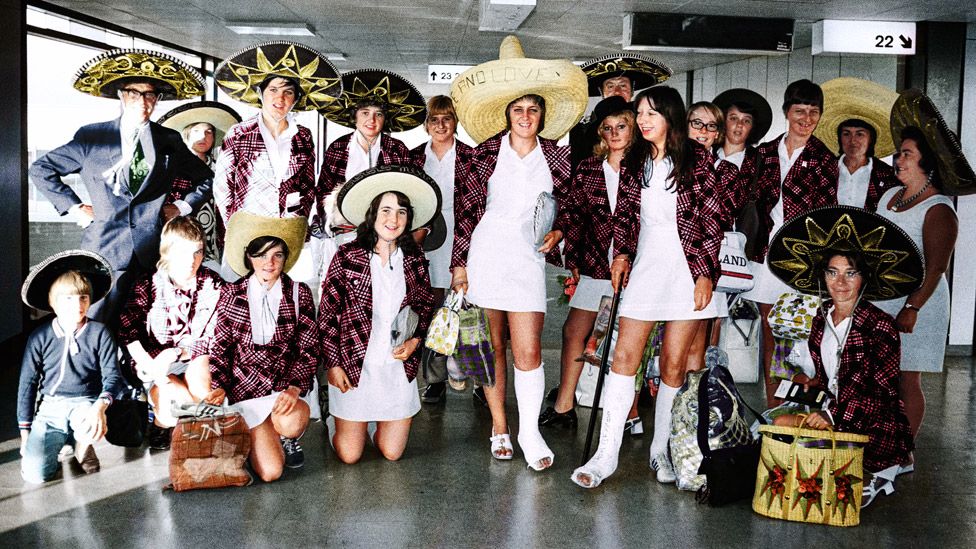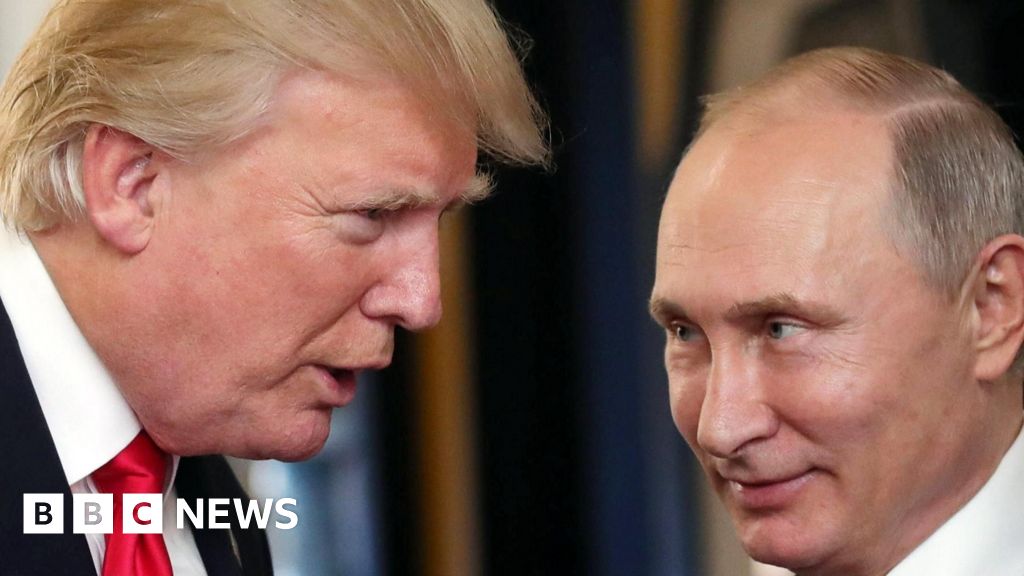ARTICLE AD BOX
 Image source, New Black Films/Victor Crawshaw/Marina Amaral
Image source, New Black Films/Victor Crawshaw/Marina Amaral
The English players and manager took part without the permission of the footballing authorities
By Ian Youngs
Entertainment & arts reporter
In 1971, an unofficial women's football World Cup attracted crowds of more than 100,000, but was quickly erased from history. Now a new film tells the remarkable story of the tournament, and the disappointment that followed.
For the English players, landing in Mexico was like being "launched into a parallel universe", captain Carol Wilson recalls.
She and other female footballers were used to being obstructed, overlooked and ridiculed at home. They played on park pitches to handfuls of spectators. A ban on the women's game had only just been lifted by the Football Association after 50 years.
So the players were unprepared for the reception they received in the tournament's host country.
Treated like superstars
Hundreds of Mexican fans were waiting, as were photographers. "We went from nothing to flashlights that blinded you once we got off the plane," Wilson recalls. "And it didn't stop for the whole five weeks that we were there."
They were treated like superstars, with crowds waiting for autographs, camping outside their hotel and mobbing their team coach.
"The public took us straight to their hearts," Wilson continues. "They just followed us everywhere. We were so welcomed by everybody. I can't personally put that into words to make you understand how that really was."
Image source, Getty Images
Image caption,The squad attended the UK premiere at the London Film Festival in October
The story of England's "Lost Lionesses" was told in a BBC article in 2019. Now, a documentary called Copa 71 shines a light on the tournament. The film's opening is narrated by tennis legend Serena Williams, who is an executive producer alongside sister Venus.
The pair are "two of the greatest female athletes of all time and are both heavily involved in activism and in wanting to promote stories which deepen our understanding of the history of women's sport", the film's co-director Rachel Ramsay says.
Ramsay echoes the idea that the film shows a glimpse of a "parallel universe" in which women's football had not been suppressed.
"When we started researching the story and started speaking to the women, you realise that they have so much to say, and that they've had their voices taken away from them for 50 years."
Image source, New Black Films/TopFoto/Marina Amaral
Image caption,The final is estimated to have been watched by more than 100,000 fans
Women from the different nations all recount similar stories of being told football was not for girls. So it's sweeter for them when the Mexico tournament offers a taste of equality and popularity.
Although no official attendance figures exist, estimates suggest the final was watched by more than 100,000 people - which would make it the best-attended women's sporting event in history.
Ironically, the tournament owed its success to the fact that world football's governing body Fifa tried to block it.
The documentary says Fifa's ban forced organisers to find stadiums that were not controlled by the Mexican football federation. So the games ended up being played in the country's two biggest venues, which were controlled by the country's dominant media group - and the company heavily promoted the event in order to sell tickets.
The matches were shown live on Mexican TV. Ramsay and her team have tracked down that footage, which has not been seen for more than 50 years, as well as home movies shot by fans.
Many players kept scrapbooks from the tournament
The result is not a typical sports documentary, she says. For one thing, viewers don't root for a particular team or player. For another, it's about women.
"There are whole films, series and books written and made about single men's tournaments, matches, goals and players - and they're done multiple times," Ramsay says.
"We hope that this film is the start of a whole genre of women's sports films. Because when we started making this, it was very hard to find comparisons, to find other films that were similar, especially films told from the perspective of women in their 70s.
"It was difficult to convince people at some points that these women should be on screen and should be telling their story." That was a "deal breaker" for Ramsay, however.
"The number of times I was told, 'You can't have a sports film where you don't have one winner that you want to win'. I said, 'Well actually I think we can because I think the winner is the tournament itself, the fact that it happened, and the shared experience of those women together is a huge part of the film'.
"So being able to play with the genre, and tell stories in a different way and not feeling like we have to go with a cookie-cutter version of what people think sports film looks like, that was really important."
Once the tournament was over, however, the participants came back down to earth with a jolt.
Image source, New Black Films/Mirrorpix/Marina Amaral
Image caption,Manager Harry Batt was banned for life for going against the wishes of the Women's Football Association
The English team's manager, Harry Batt, was blacklisted by the fledgling Women's Football Association, which was in the process of putting together the first official England team. Some players were also banned.
Mexico 1971 had shown that women's football could be popular and commercially viable, but the male footballing authorities saw that as a threat, the documentary claims. The memory of the event, and the potential for women's football, were buried for decades.
"The women involved themselves didn't speak much about it, especially the England team," Ramsay says.
"When they came back after the tournament, they believed quite rightly that the world had shifted and that women's football was here to stay. They saw a whole new dawn for women's sport.
"And then it was violently taken away from them. They lived with that trauma and that disappointment and that feeling of being gaslit by society.
"And on an establishment level, a wildly successful record-breaking women's football tournament did not work with the narrative of the international and national football associations around the world.
"I think there was an understanding that it would dilute the power of men's football to have women playing the same game. That is something that we're only just recovering from now.
"The growth in the women's game has been extraordinary in the last couple of years. But we're still playing catch-up."
Emotional memories
The documentary received glowing reviews after its premiere at last year's Toronto Film Festival, with Screen International's Fionnuala Hannigan calling it "a crowd-pleaser, like those record-breaking matches".
The Hollywood Reporter's Daniel Fienberg said it "exposes an obscured chapter in history and thrusts its heroes into a well-deserved spotlight".
He wrote: "I got teary at several points because the sense that these are stories that have been waiting for an outlet for decades is so very palpable."
For Wilson, watching the film was "very emotional".
"It took me straight back to 1971. I felt like I was there. I was transported, if you like."
Recent World Cups and Euros have started to fulfil the potential for women's football, but "we could have been a lot further a lot sooner", she says.
Another English player, Chris Lockwood, agrees that it was "so good" to see the film.
The memories it brought back are tinged with sadness, though. "The sadness of Harry being banned for life, and the sadness that the story was hidden.
Copa 71 is released in UK cinemas on Friday, 8 March.

 10 months ago
74
10 months ago
74








 English (US) ·
English (US) ·